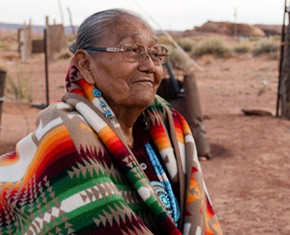The views expressed in our content reflect individual perspectives and do not represent the authoritative views of the Baha'i Faith.
All of the great prophets and holy messengers were once refugees—exiles who sought, taught and relied on human kindness.
Consider the great difficulties they endured: abused, tortured, exiled from their native lands, made to wander in foreign places without support or sustenance, persecuted and even executed, every one of God’s messengers suffered as migrants and refugees.
Abraham, fleeing from a severe famine in his homeland of Canaan, migrated to Egypt. Buddha left his royal life and migrated to Rajagaha, where he became a mendicant, a homeless beggar for alms in the street. Christ’s family fled Bethlehem after Joseph’s dream about King Herod’s dictate to kill all male infants, and entered Egypt as poor migrants. These prophets and many others, the Baha’i teachings explain, became exiles, refugees and immigrants:
Moses was persecuted and driven out into the desert, Abraham was banished, Muhammad took refuge in caves, the Bab was killed and Baha’u’llah was exiled and imprisoned forty years. Yet all of Them desired fellowship and love among men. They endured hardships, suffered persecution and death for our sakes that we might be taught to love one another and be united and affiliated instead of discordant and at variance. Enough of these long centuries which have brought such vicissitudes and hardships into the world through strife and hatred. Now in this radiant century let us try to do the will of God that we may be rescued from these things of darkness and come forth into the boundless illumination of heaven, shunning division and welcoming the divine oneness of humanity. – Abdu’l-Baha, The Promulgation of Universal Peace, p. 234.
Perhaps these experiences of privation, persecution and great difficulty as strangers in a strange land made all of the prophets develop enormous empathy for the displaced.
The Baha’i teachings certainly reflect that high level of empathy:
Be always kind to everyone and a refuge for those who are without shelter. – Abdu’l-Baha, Abdu’l-Baha in London, p. 75.
We must look upon our enemies with a sin-covering eye and act with justice when confronted with any injustice whatsoever, forgive all, consider the whole of humanity as our own family, the whole earth as our own country, be sympathetic with all suffering, nurse the sick, offer a shelter to the exiled, help the poor and those in need, dress all wounds and share the happiness of each one. – Abdu’l-Baha, Divine Philosophy, p. 41.
Therefore strive that your actions day by day may be beautiful prayers. Turn towards God, and seek always to do that which is right and noble. Enrich the poor, raise the fallen, comfort the sorrowful, bring healing to the sick, reassure the fearful, rescue the oppressed, bring hope to the hopeless, shelter the destitute! – Abdu’l-Baha, Paris Talks, p. 81.
These noble aims, repeated in the scriptures of all the great global religions, urge us to see exiles, immigrants and refugees as human beings just like us—not as foreigners, strangers or usurpers, but as fellow human beings who need our help:
When a man turns his face to God he finds sunshine everywhere. All men are his brothers. Let not conventionality cause you to seem cold and unsympathetic when you meet strange people from other countries. Do not look at them as though you suspected them of being evil-doers, thieves and boors. You think it necessary to be very careful, not to expose yourselves to the risk of making acquaintance with such, possibly, undesirable people.
I ask you not to think only of yourselves. Be kind to the strangers, whether come they from Turkey, Japan, Persia, Russia, China or any other country in the world.
Help to make them feel at home; find out where they are staying, ask if you may render them any service; try to make their lives a little happier.
In this way, even if, sometimes, what you at first suspected should be true, still go out of your way to be kind to them—this kindness will help them to become better.
After all, why should any foreign people be treated as strangers? …
Put into practice the Teaching of Baha’u’llah, that of kindness to all nations. Do not be content with showing friendship in words alone, let your heart burn with loving kindness for all who may cross your path. – Ibid., pp. 15-16.
For Baha’is, all consultation on difficult social issues like immigration starts with identifying the spiritual principles involved. These universal spiritual principles—the oneness of the human race; the consideration of the whole Earth as one country; kindness and compassion to all regardless of their customs, creed or culture—urge us to offer shelter to the exiled, the homeless and the immigrant.
Certainly we can all do our best to extend that loving hand of compassion and kindness to those we meet personally—but what about the policies of our countries? How can we best influence the immigration policies and practices of our various nations so they begin to reflect a more spiritual reality?
In the next essay in this series, we’ll examine that tough question.
















Comments
Sign in or create an account
Continue with Googleor